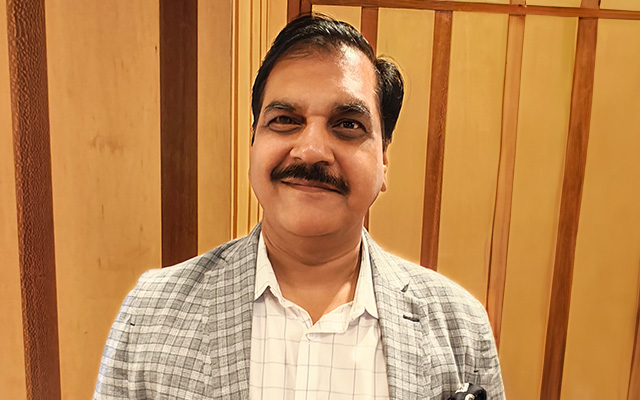Amaresh Tiwari, vice chairman of the India Convention Promotion Bureau (ICPB), discusses the recovery of India’s events sector post-pandemic and the efforts taken to lift awareness of Indian states in the minds of international event buyers
 How does India’s events industry look today?
How does India’s events industry look today?
The MICE sector was the quickest to recover post-pandemic. All members of the ICPB have surpassed their 2019 business levels, whereas other segments, such as inbound leisure tourism, have been slower to rebound.
The Indian government leveraged its G20 presidency to highlight the country’s diverse tourism offerings and showcase its expanding MICE infrastructure. Notably, every Indian state and union territory hosted some of the G20-related events, providing nationwide exposure.
Another positive development in recent times has been the establishment of large convention centres across India, such as Bharat Mandapam and Yashobhoomi in New Delhi; Jio World Convention Centre in Mumbai; and Biswa Bangla Convention Centre in Kolkata. Previously, India received enquiries for conferences accommodating 600 to 2,000 attendees. Now, the country is attracting enquiries for groups of 7,000 to 8,000 participants. Thanks to these new, expansive venues, India is now capable of hosting events on a scale that was previously not possible.
India’s inbound events demand has traditionally been driven by conferences and exhibitions. Are there other interesting trends in this regard?
India’s strong consumer market, along with its expertise in sectors like pharmaceutical and information technology, has long attracted international conferences and exhibitions. However, there is now a growing demand for India as an incentive travel destination. Markets that previously did not consider India, such as those in South America like Argentina, Colombia, Chile and Peru, are increasingly showing interest. Demand from Europe for incentive travel to India is also on the rise.
India’s political and economic stability is a key factor in attracting international MICE events, especially at a time when global challenges like the Russia-Ukraine war, the Middle East crisis, and the economic slowdown in the US are impacting other regions. In contrast, India has emerged as a bright spot on the global stage.
At major industry events such as IBTM World and IMEX Frankfurt, India’s positive image as a destination is evident. The demand for India has significantly increased, with data from IMEX showing that interest in the country, which previously ranged between three to five per cent, has now surged to 12 to 15 per cent among buyers.
Prior to the pandemic, ICPB was looking to create a corpus fund in association with the government in order to bid for international conferences. What has been achieved so far?
We have been consistently advocating for a government-supported bidding process to attract international MICE events. At every opportunity, we emphasise to the government that it’s not just about having the infrastructure in place; marketing and bidding are equally crucial. To secure international conferences, a formal bidding process is essential.
Fortunately, the government is beginning to acknowledge the importance of bidding for bringing in international business. In a recent meeting with the secretary of tourism, V Vidyavathi, she expressed a positive outlook on the need for such a system. During the discussion, we presented data highlighting the events India could potentially bid for. Conversations are progressing at higher government levels, and we are hopeful that a formal bidding mechanism for international MICE events will be implemented soon.
What steps is ICPB taking to strengthen its functioning?
We are prioritising research and data management, aiming to strengthen ICPB’s role as a national convention bureau. One of our key objectives is to expand ICPB’s presence by establishing state chapters, as we have already done in West Bengal, Gujarat, and Madhya Pradesh.
Skilling is critical for the industry’s growth, and to address this, ICPB is launching the Certified Conference Specialist programme in collaboration with Amity University. This programme will cover essential areas such as RFP processes, bidding, project management, costing, presentation, and communication, with industry and academic experts leading the courses. Participants will receive a joint certification from Amity University and ICPB. Additionally, we are partnering with the University Grants Commission to introduce a four-month diploma course in conference management.
Tourism in India is a state subject. Do you think there is a need to engage more with different Indian states to grow the business events market?
As a bureau, we are actively engaging with states to raise awareness about the economic benefits of the MICE sector. We are encouraging individual states to develop their own marketing efforts to attract MICE events, and we are offering our support in creating comprehensive marketing plans, long-term strategies, and roadmaps for MICE promotion.
We are also guiding states on the appropriate budget allocations needed for activities such as roadshows, both domestic and international, and fam trips.
Additionally, we are working to establish offices within state tourism departments, where we aim to appoint senior-level bureaucrats as ICPB state chapter chairpersons, along with a representative from our team. This initiative will help us cover the entire country, promoting various states, and contributing to the growth of the MICE sector across India.





















